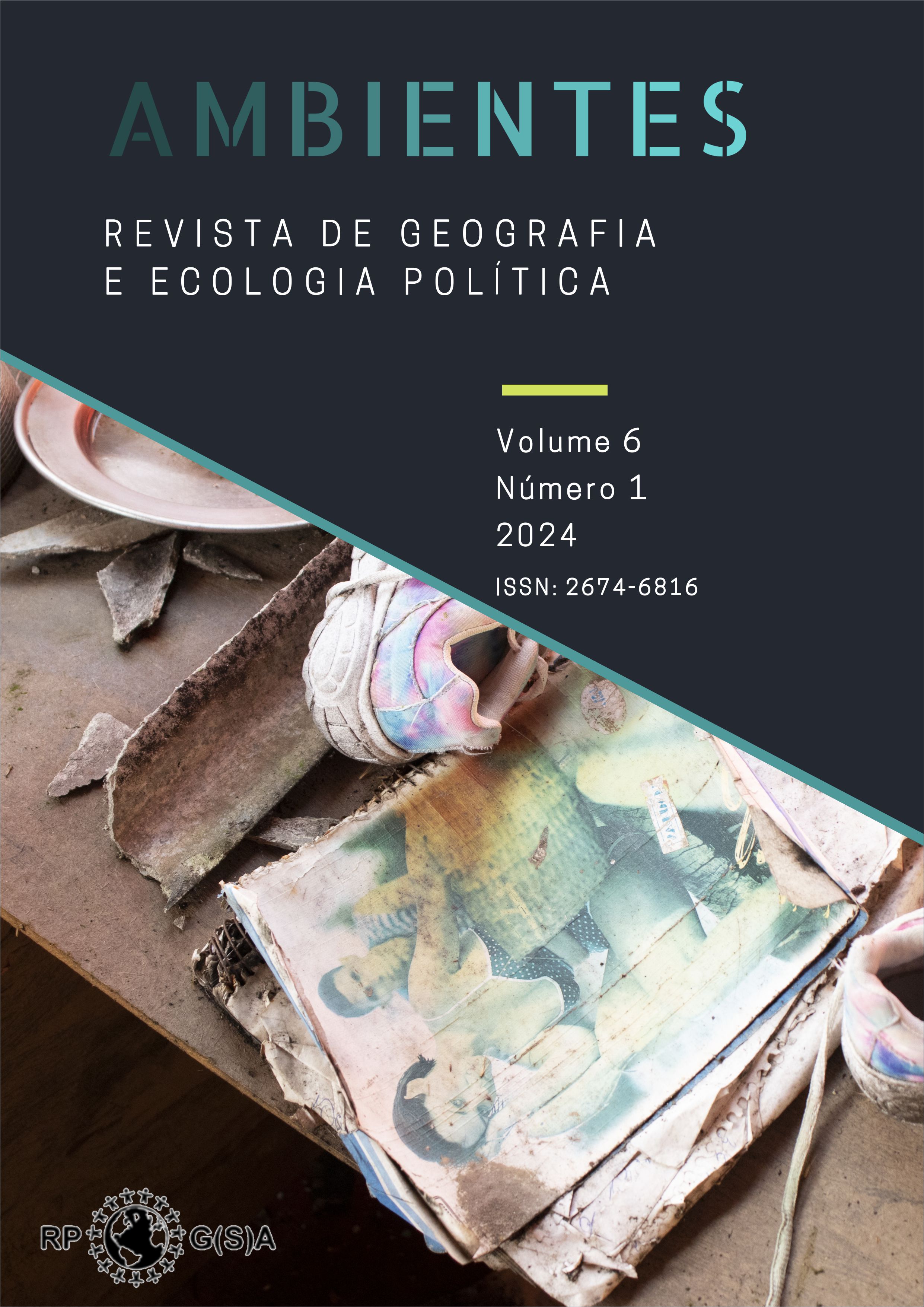De los límites planetarios a los límites sociales: Un argumento a favor de la autolimitación definida colectivamente
From planetary boundaries to social boundaries: An argument for collectively defined self-limitation
DOI:
https://doi.org/10.48075/amb.v6i1.33623Resumen
El concepto de límites planetarios ha cambiado radicalmente el vocabulario y la representación de los asuntos ambientales globales. Aquí aportamos una perspectiva crítica desde las ciencias sociales a este marco, a través de la noción de límites sociales. Nuestro objetivo es permitir una comprensión más matizada de la naturaleza social de los límites. Comenzamos destacando las fortalezas y debilidades de la perspectiva de límites planetarios desde la mirada de las ciencias sociales. Luego nos enfocamos en las sociedades capitalistas como una heurística para discutir sus dinámicas expansivas, las relaciones de poder y los obstáculos generados desde las sociedades modernas, que impulsan relaciones sociales altamente insostenibles con la naturaleza. Si bien formular límites sociales implica un proceso polémico, basado en juicios normativos, preocupaciones éticas y luchas sociopolíticas, tiene también el potencial de ofrecer pautas para una transformación socioecológica justa. La autonomía colectiva y las políticas de autolimitación son elementos clave de los límites sociales y se relacionan con propuestas importantes y experiencias pluriversales que integran el bienestar y los límites. El papel del Estado y las propuestas radicales de enfoques alternativos respecto del bienestar son particularmente importantes. Concluimos con reflexiones sobre la libertad social, definida como el derecho a no vivir a expensas de los demás. Con el objetivo de avanzar hacia la definición de estos límites a través de procesos transdisciplinarios y democráticos, con este artículo buscamos abrir el diálogo sobre estos temas.
Palabras clave: Límites planetarios; Límites sociales; Capitalismo; Transformaciones socioecológicas; Autolimitación; Ciencias Sociales críticas.
From planetary boundaries to social boundaries: An argument for collectively defined self-limitation
Abstract
The concept of planetary boundaries has radically changed the vocabulary and representation of global environmental issues. Here we bring a critical social science perspective to this framework through the notion of social boundaries. Our aim is to enable a more nuanced understanding of the social nature of boundaries. We begin by highlighting the strengths and weaknesses of the planetary boundaries perspective from a social science perspective. We then focus on capitalist societies as a heuristic to discuss their expansive dynamics, power relations and obstacles generated from modern societies, which drive highly unsustainable social relations with nature. While formulating social limits implies a contentious process, based on normative judgments, ethical concerns and socio-political struggles, it also has the potential to offer guidelines for a just socio-ecological transformation. Collective autonomy and the politics of self-limitation are key elements of social boundaries and relate to important proposals and pluriversal experiences that integrate well-being and boundaries. The role of the state and radical proposals for alternative approaches to welfare are particularly important. We conclude with reflections on social freedom, defined as the right not to live at the expense of others. With the aim of advancing towards the definition of these limits through transdisciplinary and democratic processes, this article seeks to open a dialogue on these issues.
Keywords: Planetary boundaries; Social boundaries; Capitalism; Social-ecological transformations; Self-limitation; Critical Social Sciences.
Dos limites planetários aos limites sociais: Um argumento a favor da auto-limitação definida coletivamente
Resumo
O conceito de limites planetários mudou radicalmente o vocabulário e a representação das questões ambientais globais. Aqui trazemos uma perspectiva crítica das ciências sociais para este quadro através da noção de limites sociais. O nosso objetivo é possibilitar uma compreensão mais matizada da natureza social dos limites. Começamos por destacar os pontos fortes e fracos da perspectiva dos limites planetários a partir de uma perspectiva das ciências sociais. Em seguida, centramo-nos nas sociedades capitalistas como uma heurística para discutir a sua dinâmica expansiva, as relações de poder e os obstáculos gerados pelas sociedades modernas, que conduzem a relações sociais altamente insustentáveis com a natureza. Embora a formulação de limites sociais implique um processo contencioso, baseado em julgamentos normativos, preocupações éticas e lutas sociopolíticas, tem também o potencial de oferecer diretrizes para uma transformação socioecológica justa. A autonomia coletiva e a política de autolimitação são elementos-chave das fronteiras sociais e relacionam-se com propostas importantes e experiências pluriversais que integram bem-estar e limites. O papel do Estado e as propostas radicais de abordagens alternativas ao bem-estar são particularmente importantes. Concluímos com reflexões sobre a liberdade social, definida como o direito de não viver à custa dos outros. Com o objetivo de avançar para a definição desses limites através de processos transdisciplinares e democráticos, este artigo procura abrir um diálogo sobre estas questões.
Palavras-chave: Limites planetários; Limites sociais; Capitalismo; Transformações socio-ecológicas; Autolimitação; Ciências Sociais críticas.
Descargas
Publicado
Cómo citar
Número
Sección
Licencia

Esta obra está bajo una licencia internacional Creative Commons Atribución-NoComercial-CompartirIgual 4.0.
Aviso de Direito Autoral Creative Commons
Política para Periódicos de Acesso Livre
Autores que publicam nesta revista concordam com os seguintes termos:
1. Autores mantém os direitos autorais e concedem à revista o direito de primeira publicação, com o trabalho simultaneamente licenciado sob a Licença Creative Commons Attribution que permite o compartilhamento do trabalho com reconhecimento da autoria e publicação inicial nesta revista.2. Autores têm autorização para assumir contratos adicionais separadamente, para distribuição não-exclusiva da versão do trabalho publicada nesta revista (ex.: publicar em repositório institucional ou como capítulo de livro), com reconhecimento de autoria e publicação inicial nesta revista.
3. Autores têm permissão e são estimulados a publicar e distribuir seu trabalho online (ex.: em repositórios institucionais ou na sua página pessoal) a qualquer ponto antes ou durante o processo editorial, já que isso pode gerar alterações produtivas, bem como aumentar o impacto e a citação do trabalho publicado (Veja O Efeito do Acesso Livre).
Licença Creative Commons
Esta obra está licenciada com uma Licença Creative Commons Atribuição-NãoComercial-CompartilhaIgual 4.0 Internacional, o que permite compartilhar, copiar, distribuir, exibir, reproduzir, a totalidade ou partes desde que não tenha objetivo comercial e sejam citados os autores e a fonte.


